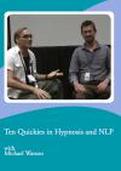
Back in the 1960s and '70s when NASA was actively engaged in the pursuit of putting astronauts on the moon, the missiles were slightly off course over 90% of the trip. And the ground crew in Houston, monitored their instruments. And adjustments were made one after another to keep things headed in the right direction. One degree here, two degrees there, until they arrived at their destination.
In this modern world we are all familiar with a GPS. These guidance systems keep track of where we are and even advise us about the route to take. And even when we vary from its instructions, the GPS will recalibrate and offer us new choices and new ways to get there.
Similarly, as we pursue our own goals and intentions, successful results come from getting feedback along the way and making one course correction after another until we accomplish our purposes. Yet there is another hidden guidance system programmed and unconscious at work as well. Virtual Questions can subtly lead us to ecstasy or agony, fulfilment or disappointment. Invisibly guiding us to places we may or may not want to go.
The task of a GPS is to answer one question ... and to keep asking and re-asking it - revising the answer as it goes along. That question is simply "How do I get from here to there?". As we journey thorough our own individual, private lives, the questions we ask ourselves unconsciously work the same way ...repetitiously checking for something ... but the problem is they aren't just about how to get somewhere. They also influence our attitudes and imaginations in ways that can cause us great happiness and success ... or not. So it's important to consider the questions you ask as you go down life's highway, and how they determine the results you get.
Now, virtual questions are generally unconscious and outside of your awareness. And depending on habituations of your "operating system" they may be words, or pictures in your mind. Yet the words are likely to be inaudible and the images invisible ones. Or maybe you just have some feeling or vague sense about it. And still the inner GPS has been set and is continually checking for something.
For example, someone who is continually wondering (virtually, that is), "Am I good enough? Am I good enough?" might suffer from a debilitating degree of uncertainty and insecurity that limit his abilities and stop him in his tracks. A woman who has suffered abuse or violence may, as result of those experiences, be constantly checking, "Am I safe? Am I safe? Am I safe?". and this internal unconscious checking creates a prevailing attitude that colors a person's entire life. The effects are demonstrated through behaviors, attitudes, personalities and more.
My grandmother was a particularly critical woman. And she seemed to have TWO virtual questions. She applied them to everything (ranging from politics to family matters to the roast beef she was eating). It was as if she was asking FIRST, "What's wrong with this?" ... and following it up with, "And whose fault is it?" The consequences of her virtual questions made her miserable, disliked, and lonely. My understanding of her was transformed the moment I recognized the pattern. I went from thinking, "What a hard, cruel woman!" to "What a bitch it must be to be HER!"
But just as virtual questions can trip us up, they can also lead to satisfaction and success and all kinds of desirable things. I know of a spiritual teacher who encourages this devotees to ask, "How can I see God in this situation?" or "What is wonderful about this moment?" An entrepreneur can use virtual questions to keep him alert to opportunities while a poet might set his guidance system to seek out moments of inspiration or a comedian might be asking "Where is the humor in this situation?".
Whatever your virtual questions might be, we ask what we've learned to ask from our experiences, and we can learn something new. We watch for what we've been taught to watch for. And we can start watching for something new. Ask leading questions that lead you where you want to go.
Virtual questions are habitual ways of influencing your state, guiding your behavior, and effecting the general quality of your experience. And bringing them to awareness is the first step to getting the best use out of them. Observing your own behavior and attitudes (especially unwanted ones) will give you some clues as to the quality of your own virtual questions.
Considering what questions would help you have more of the rich and satisfying life you want is the second step.
Step three? Practice those new questions regularly until they become new habits of thinking.
How cool is that?
In this modern world we are all familiar with a GPS. These guidance systems keep track of where we are and even advise us about the route to take. And even when we vary from its instructions, the GPS will recalibrate and offer us new choices and new ways to get there.
Similarly, as we pursue our own goals and intentions, successful results come from getting feedback along the way and making one course correction after another until we accomplish our purposes. Yet there is another hidden guidance system programmed and unconscious at work as well. Virtual Questions can subtly lead us to ecstasy or agony, fulfilment or disappointment. Invisibly guiding us to places we may or may not want to go.
The task of a GPS is to answer one question ... and to keep asking and re-asking it - revising the answer as it goes along. That question is simply "How do I get from here to there?". As we journey thorough our own individual, private lives, the questions we ask ourselves unconsciously work the same way ...repetitiously checking for something ... but the problem is they aren't just about how to get somewhere. They also influence our attitudes and imaginations in ways that can cause us great happiness and success ... or not. So it's important to consider the questions you ask as you go down life's highway, and how they determine the results you get.
Now, virtual questions are generally unconscious and outside of your awareness. And depending on habituations of your "operating system" they may be words, or pictures in your mind. Yet the words are likely to be inaudible and the images invisible ones. Or maybe you just have some feeling or vague sense about it. And still the inner GPS has been set and is continually checking for something.
For example, someone who is continually wondering (virtually, that is), "Am I good enough? Am I good enough?" might suffer from a debilitating degree of uncertainty and insecurity that limit his abilities and stop him in his tracks. A woman who has suffered abuse or violence may, as result of those experiences, be constantly checking, "Am I safe? Am I safe? Am I safe?". and this internal unconscious checking creates a prevailing attitude that colors a person's entire life. The effects are demonstrated through behaviors, attitudes, personalities and more.
My grandmother was a particularly critical woman. And she seemed to have TWO virtual questions. She applied them to everything (ranging from politics to family matters to the roast beef she was eating). It was as if she was asking FIRST, "What's wrong with this?" ... and following it up with, "And whose fault is it?" The consequences of her virtual questions made her miserable, disliked, and lonely. My understanding of her was transformed the moment I recognized the pattern. I went from thinking, "What a hard, cruel woman!" to "What a bitch it must be to be HER!"
But just as virtual questions can trip us up, they can also lead to satisfaction and success and all kinds of desirable things. I know of a spiritual teacher who encourages this devotees to ask, "How can I see God in this situation?" or "What is wonderful about this moment?" An entrepreneur can use virtual questions to keep him alert to opportunities while a poet might set his guidance system to seek out moments of inspiration or a comedian might be asking "Where is the humor in this situation?".
Whatever your virtual questions might be, we ask what we've learned to ask from our experiences, and we can learn something new. We watch for what we've been taught to watch for. And we can start watching for something new. Ask leading questions that lead you where you want to go.
Virtual questions are habitual ways of influencing your state, guiding your behavior, and effecting the general quality of your experience. And bringing them to awareness is the first step to getting the best use out of them. Observing your own behavior and attitudes (especially unwanted ones) will give you some clues as to the quality of your own virtual questions.
Considering what questions would help you have more of the rich and satisfying life you want is the second step.
Step three? Practice those new questions regularly until they become new habits of thinking.
How cool is that?

 RSS Feed
RSS Feed
